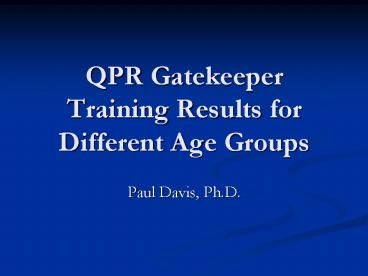QPR Gatekeeper Training Results for Different Age Groups PowerPoint PPT Presentation
1 / 11
Title: QPR Gatekeeper Training Results for Different Age Groups
1
QPR Gatekeeper Training Results for Different Age
Groups
- Paul Davis, Ph.D.
2
Introduction
- Community gatekeeper training programs typically
present information about the prevalence of
suicide, suicidal warning signs and risk factors,
and steps that can be taken to intervene in a
suicidal crisis. Although the age of the
recipients of community gatekeeper trainings can
vary significantly, little is known about
post-presentation changes in suicide knowledge
between youth and adults recipients. More
importantly, little is known about
post-presentation changes in attitudes toward
intervening in a suicidal crisis to help save a
life.
3
Goal
- The goal of this study was to explore whether
differences between youth and adults exist in
self-reported measures of suicide prevention
knowledge, resources, and attitudes toward
intervening in a suicidal crisis after receiving
a one-hour gatekeeper training in youth suicide
prevention.
4
Methods
- A total of 404 (171 male, 233 female)
individuals (ages 11 to 75) completed the QPR
Institute (QPRI)-Washington State Youth Suicide
Prevention Program (WSYSPP) Pre-Post Test in
community gatekeeper trainings in Washington
State during 2000-2001. The questionnaire was
created by QPRI to assess post-training changes
in knowledge of suicide prevention information
and resources (low, medium, high), and attitudes
toward intervening in suicidal crisis (not very
likely, somewhat likely, and very likely) after
receiving a QPRI/WSYSPP Gatekeeper Training.
5
Questionnaire
- Questionnaire items are presented in Table 1.
- Four groups were created to explore differences
in post-presentation knowledge and attitude
changes (11-14 15-18 19-24 25 and older).
Analyses were also completed to assess gender
effects between two age groups (11-24 25 and
older).
6
Table 1 Knowledge Items
- How would you rate your knowledge of suicide in
the following areas (low, medium, high)? - - Facts concerning suicide prevention
- - Warning signs of suicide
- - How to ask someone about suicide
- - Persuading someone to get help
- - How to get help for someone
- - Information about local resources for help
with suicide - Please rate your level of understanding about
suicide and suicide prevention
7
Table 1 Cont. Attitude Items
- How likely it would be for you to do the
following things (not very likely, somewhat
likely, highly likely) - - Ask someone if they are suicidal
- - Tell a suicidal person who to talk to for help
- - Call a crisis line (e.g., 911) to get help for
someone you believe is about to suicide - - Go with a suicidal person to get help (e.g.,
hospital, mental health center, counselor) - - If you believe someone might be thinking
about suicide, would you feel that asking them
about suicide is appropriate? (never, sometimes,
always)
8
Results
- Quality of Training
- 95 of the respondents rated the overall quality
of the training in the good to excellent range
(28 excellent, 42 very good, 25 good, 4 fair,
and 1 poor). 94 endorsed recommending the
trainings to others. - Pre-Post Changes in Knowledge and Attitudes.
- Repeated measures analysis showed significant
self-reported post-test increases for measures of
knowledge and attitudes for all four age groups.
9
Results
- Post-test Differences in Knowledge by Age Group
- Results indicate that the youngest participants
(11-14 year-olds) rated themselves lower than
older participants in their knowledge of suicidal
facts, how to ask someone about suicide, and how
to persuade someone to get help.
10
Post-test Differences in Attitude by Age Group
- Results also indicate that the youngest
participants (11-14 year-olds) rated themselves
lower than older participants in the likelihood
that they would engage in all of the suicide
prevention interventions listed for someone they
knew was suicidal. In addition, 15-18 year-olds
rated themselves lower than those 25 and older in
the likelihood that they would ask someone if
they were suicidal and go with a suicidal person
to get help. Thus it appears mature adults may
be better prepared to act as suicide prevention
gatekeepers for youth.
11
Contact Information
- Paul Davis, Ph.D. can be contacted through the
QPR Institute. This paper was presented in a
poster session at the 2001 Annual Conference of
the American Association of Suicidology. Contact
the QPR Institute for data tables.

